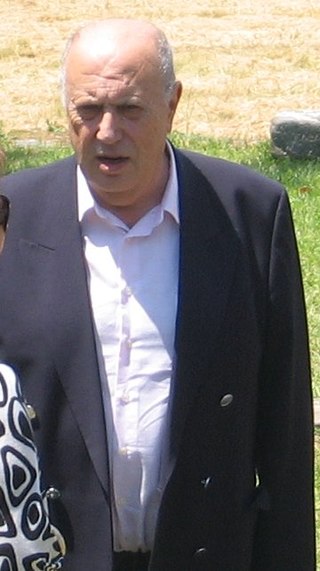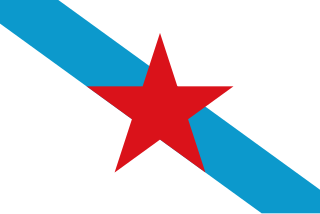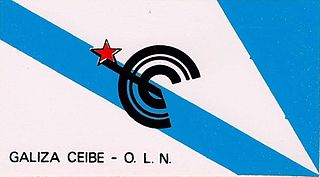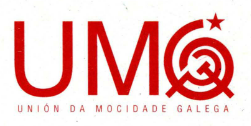Related Research Articles

The Galician Nationalist Bloc is a political party from Galicia, formed with the merger of a series of left-wing Galician nationalist parties. It is self-defined as a "patriotic front".
The Brest Charter was a document signed by several European far-left separatist groups in February 1974, in Brest, Brittany, France. The Charter advocated for a Europe of independent socialist states and affirmed “the right of the oppressed people to respond to counter-revolutionary violence with revolutionary violence.” The initial signatories were the Official branch of the Irish Republican Movement, the Breton Democratic Union (UDB), and the Galician People's Union (UPG). Herriko Alderdi Sozialista signed the charter a few weeks later.
Galician Revolutionary Students was a leftwing nationalist students organization in Galicia, Spain. ERGA functioned as the students wing of the Galician People's Union (UPG). ERGA was founded in 1972. ERGA published a monthly, Lume. ERGA was the first mass organization of nationalism after the Spanish Civil War, got a broad presence in the universities and high schools of Galiza and formed future UPG leaders and militants.

Communist Party of National Liberation was a separatist political party in Galicia, Spain. PCLN was founded on 25 July 1986 by the 22 March Communist Collective. The collective had been launched earlier by 13 Central Committee members of the Galician People's Union (UPG) left UPG in protest of the decision of the Galician Nationalist Bloc to participate in the Galician parliament. Front figures of the collective was Mariano Abalo, general secretary of UPG, and Xan Carballo, general secretary of INTG.

Xosé Luís Méndez Ferrín is a Galician writer and poet and is widely considered the highest representative of contemporary Galician literature. A doctor in philology, he studied philosophy at the University of Santiago de Compostela and Romanic philology at the University of Madrid.
The Galician People's Union is a Galician nationalist and communist political party, and is one of the registered political parties of Spain. The party publishes the magazine Terra e Tempo, and the secretary general is Néstor Rego.
The Galician People's Front is a Galician political organization with a socialist and independentist ideology.

Galician nationalism is a form of nationalism found mostly in Galicia, which asserts that Galicians are a nation and that promotes the cultural unity of Galicians. The political movement referred to as modern Galician nationalism was born at the beginning of the twentieth century from the idea of Galicianism.
Loita Armada Revolucionaria(LAR) (English: Revolutionary Armed Struggle) was an armed Galician nationalist and left-wing independentist organisation. Linked to the political party Galician Party of the Proletariat and the organization Galiza Ceibe-OLN, the group was formed in 1978 and carried out several attacks around Galicia, such as bank assaults and bombing campaigns.

Galiza Ceibe-OLN was an independentist and socialist political party in Galicia, Spain. Galiza Ceibe was founded on 1980 by the Galician Party of the Proletariat as a political and electoral front, originally to present a list in Vigo and in other galician municipalities under the name Agrupación Electoral Galicia Ceibe in the 1979 local elections.
The Assembly of the United People (APU) was a Galician political organization, with an independentist, socialist and feminist ideology. It was formed in 1989 from a split of the first Galician People's Front, and disappeared with its self-dissolution in 1995.
The Galician Party of the Proletariat (PGP) was a party galician independentist and Marxist-Leninist party formed in March 1978, as a continuation of Galician People's Union-Proletarian Line, a split of the original Galician People's Union. The Central Committee was clandestine, and even the party militants didn't know the members of it. The party supported armed struggle, which considered as anti-imperialist and anti-oligarchic. Its official magazine was called Sempre en Galiza.
Isca! is the name of a Galician youth organization that promotes Galician independence, combined with anti-capitalist and feminist ideology. They are linked to the Galician Movement for Socialism, a socialist and pro-independence party that forms part of the Galician Nationalist Bloc (BNG).

The Galician National-Popular Bloc was a Galician electoral candidacy. It had as the national sovereignty for Galiza as its main objective and as an alternative to autonomism. It was formed by the Galician People's Union (UPG) and Galician National-Popular Assembly (ANPG).
The Galician Social Democratic Party was a Galician political party with a Galician nationalist and social democratic ideology.

The Galician Youth Union is the youth wing of the Galician People's Union. It was created in August 1977.

Sindicato Labrego Galego-Comisións Labregas is a Galician farmers' and breeders' union centered on family farms and small peasants.
Communist Movement of Galicia was a communist political party created in Galicia during the last years of the dictatorship of Franco as the Galician section of the Communist Movement, although in practice the MCG acted as an independent party. The leaders of the MCG were Xesús Veiga Buxán and Carmen Santos Castroviejo. Unlike other sections of Spanish left-wing political parties, the MCG was close to the Galician nationalist movement and supported self-determination and national sovereignty for Galicia.
The Exército Guerrilheiro do Povo Galego Ceive was an armed organization formed in 1986 mainly by members of Galiza Ceibe-OLN. It was considered a terrorist organisation by the Spanish Government. The main goals of the organization were the independence of Galicia and the transformation of society according to the principles of socialism. The EGPGC was operative between 1987 and 1991, a time during which the EGPGC made a total of 90 armed actions and a multitude of provisioning actions.

Néstor Rego Candamil is a Galician teacher, politician and a member of the Congress of Deputies of Spain. He is leader of the Galician People's Union.
References
- ↑ "Da viabilidade económica das pequenas naçons [1]".
- ↑ Land and Time. [ dead link ]